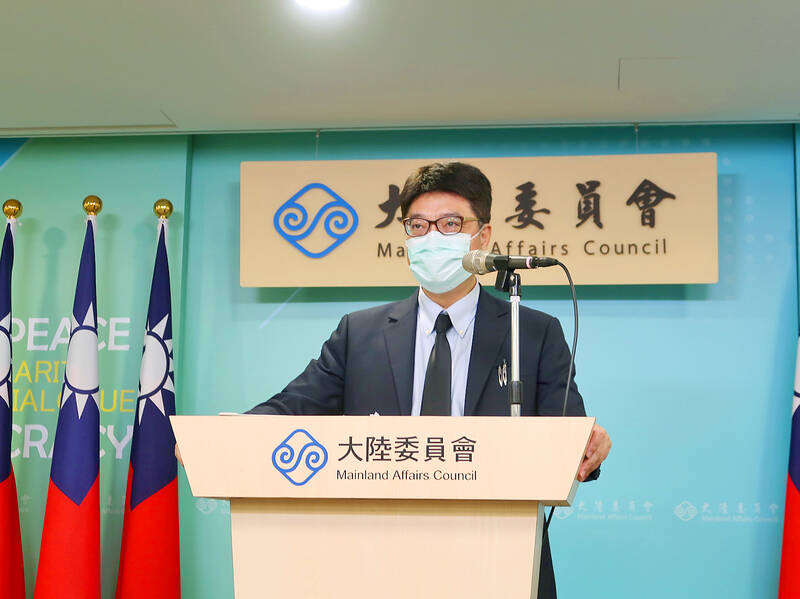The Mainland Affairs Council (MAC) on Thursday said it hopes the spirit of cinematic freedom would be respected, after Hong Kong joined China in boycotting the Golden Horse Awards.
The Hong Kong Motion Picture Industry Association reportedly sent an e-mail to its members on Tuesday instructing them to “think twice” before participating in the 59th annual awards, which are to be held in Taipei on Nov. 19.
The move follows years of boycotts by the China Film Administration, which in 2019 banned Chinese from participating in the event.

Photo: Chen Yu-fu, Taipei Times
In the letter, the group references the “gradual politicization” of the event, known locally as the Oscars of the Chinese-speaking world.
“Many Taiwanese directors and artists have repeatedly made comments that have nothing to do with the art of filmmaking, mixing politics with cinema and tainting independent artistry,” the message said. “This has dragged the entire event down a controversial path.”
Industry members should think twice before attending “to avoid getting involved in unnecessary disputes and losing more than you gain,” it added.
Asked about the issue on Wednesday, China’s Taiwan Affairs Office spokeswoman Zhu Fenglian (朱鳳蓮) told a routine news conference that China “has always enthusiastically supported” activities that promote mutual understanding and recognition across the Taiwan Strait.
“As for those events with political overtones, that is another matter,” she said.
MAC spokesman Chiu Chui-cheng (邱垂正) yesterday said that the Golden Horse Awards respect artistic freedom and serve as a badge of honor for those working in the Chinese-language film industry.
“We hope that the liberal environment and spirit of filmmaking can be respected, and we will always welcome excellent films with open arms,” he added.

Chinese Nationalist Party (KMT) Chairman Eric Chu (朱立倫), spokeswoman Yang Chih-yu (楊智伃) and Legislator Hsieh Lung-chieh (謝龍介) would be summoned by police for questioning for leading an illegal assembly on Thursday evening last week, Minister of the Interior Liu Shyh-fang (劉世芳) said today. The three KMT officials led an assembly outside the Taipei City Prosecutors’ Office, a restricted area where public assembly is not allowed, protesting the questioning of several KMT staff and searches of KMT headquarters and offices in a recall petition forgery case. Chu, Yang and Hsieh are all suspected of contravening the Assembly and Parade Act (集會遊行法) by holding

PRAISE: Japanese visitor Takashi Kubota said the Taiwanese temple architecture images showcased in the AI Art Gallery were the most impressive displays he saw Taiwan does not have an official pavilion at the World Expo in Osaka, Japan, because of its diplomatic predicament, but the government-backed Tech World pavilion is drawing interest with its unique recreations of works by Taiwanese artists. The pavilion features an artificial intelligence (AI)-based art gallery showcasing works of famous Taiwanese artists from the Japanese colonial period using innovative technologies. Among its main simulated displays are Eastern gouache paintings by Chen Chin (陳進), Lin Yu-shan (林玉山) and Kuo Hsueh-hu (郭雪湖), who were the three young Taiwanese painters selected for the East Asian Painting exhibition in 1927. Gouache is a water-based

Taiwan would welcome the return of Honduras as a diplomatic ally if its next president decides to make such a move, Minister of Foreign Affairs Lin Chia-lung (林佳龍) said yesterday. “Of course, we would welcome Honduras if they want to restore diplomatic ties with Taiwan after their elections,” Lin said at a meeting of the legislature’s Foreign Affairs and National Defense Committee, when asked to comment on statements made by two of the three Honduran presidential candidates during the presidential campaign in the Central American country. Taiwan is paying close attention to the region as a whole in the wake of a

OFF-TARGET: More than 30,000 participants were expected to take part in the Games next month, but only 6,550 foreign and 19,400 Taiwanese athletes have registered Taipei city councilors yesterday blasted the organizers of next month’s World Masters Games over sudden timetable and venue changes, which they said have caused thousands of participants to back out of the international sporting event, among other organizational issues. They also cited visa delays and political interference by China as reasons many foreign athletes are requesting refunds for the event, to be held from May 17 to 30. Jointly organized by the Taipei and New Taipei City governments, the games have been rocked by numerous controversies since preparations began in 2020. Taipei City Councilor Lin Yen-feng (林延鳳) said yesterday that new measures by